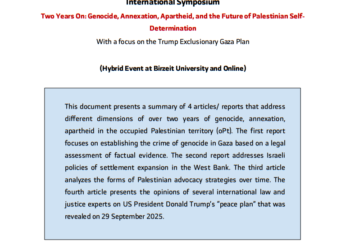Revisiting Jurisdiction at the ICC: Challenging Attempts to Block Accountability for Israeli Officials
States, Civil Society, and Jurists Must Act Against Efforts to Impede Justice
By: James Henderson – Law for Palestine
On the 27th June, the Pre-Trial chamber of the International Criminal Court (ICC) granted leave for written submissions on jurisdictional issues concerning the issue of arrest warrants for Israeli nationals.[1] This decision was in response to a request made by the United Kingdom on 10th June, which raised concerns regarding the ability of the State of Palestine to grant jurisdiction to the ICC over Israeli nationals given that under the Oslo Accords Palestinian authorities do not have jurisdiction over Israeli nationals.[2] In effect, the UK is raising the argument of ‘nemo dat quod non habet’ – ‘no one can give what they do not have’.
This is not a new argument before the ICC. The Office of the Prosecutor at the ICC had already raised concerns on jurisdictional applicability, which saw an initial investigation into the issue of territorial jurisdiction with multiple submissions made by states and other interested parties under the same argument. The Pre-Trial chamber in February 2021 ruled that the State of Palestine’s territorial jurisdiction extends to all territories occupied by Israel since 1967, noting the affirmation of Palestine and the right to Palestinian self-determination by the UN General Assembly, UN Security Council and the International Court of Justice.[3] On the issues and arguments presented to the Chamber on the Oslo Accords itself, specifically The Interim Agreement on the West Bank and the Gaza Strip (Oslo II), the Chamber determined that these arguments are not relevant to resolving the current matter. The issue at hand is the scope of the Court’s territorial jurisdiction in Palestine for the purpose of allowing the Prosecutor to initiate an investigation.[4] In essence, while the Pre-Trial chamber noted that the ICC has jurisdiction over the State of Palestine, the court kicked the jurisdiction of nationals down the road to be addressed later.
The Oslo Accords are still clung to by a select few states and politicians, usually Israel’s allies, as the “only road to peace in the Middle East,” ignoring the absolute failure of the treaties and its consistent and blatant violations by Israeli armed forces and settlers. The Oslo Accords remains a rotten deal for the Palestinian people, best described by the late Edward Said at the time of signing as a “Palestinian Versailles”.[5] Instead of working towards self-determination and ending Israel’s illegal occupation, Israel uses the Oslo Accords to maintain its settler colonial regime across the occupied Palestinian territory (oPt), extend its control over the West Bank, accelerate its illegal settlement construction and reinforce its apartheid regime over the Palestinian people.[6] Now, upgrading from simply reinforcing Israeli impunity for violations in the oPt domestically, the United Kingdom is attempting to use the Oslo Accords to block accountability for Israeli war crimes, crimes against humanity, and genocide by the ICC.
The need for international accountability is clear. Recent casualty statistics from Gaza show that over 38,000 people have been killed by Israel as it continues on with its genocidal rampage, with the overall dead from the conflict indirectly potentially reaching 186,000, representing nearly 8% of the Palestinian population within Gaza.[7] Israel has been aided and abetted in this genocide with material from Western states who seem to care little about their obligations to protect the civilian population. We have seen consistently, since the formation of Israel in 1948, that Israel does not investigate its crimes committed against Palestinians by either state actors or private individuals as a matter of state policy.[8] South Africa, in their arguments at the International Court of Justice in the case for provisional measures against the Israeli Genocide in Gaza, reiterated how Israeli soldiers have acted intentionally, fulfilling their government mandate to kill women and children.[9] Today, be it attacks by settlers on Palestinian homes in the West Bank or the bombing of hospitals in Gaza, Israel acts intentionally, maliciously and with impunity reinforced by the support of western states such as the United Kingdom.
The Oslo Accords must not be used to grant impunity under international law for the most heinous crimes being committed against Palestinians. Given the blatant disregard Israel has for Oslo, failing to participate in the process that is meant to lead to Palestinian sovereignty, it is fundamentally absurd to let Israel and its allies use it as a shield to prevent justice for clear and blatant violations in Gaza, as well as in the West Bank and illegally annexed East Jerusalem. The validity of the Oslo Accords as a treaty in and of itself should also be brought into question by the court, as it has been by multiple scholars and academics, both Palestinian and international.[10] Aside from lack of compliance with the treaty from the Israelis, Oslo also contradicts numerous Jus Cogens norms as well as the Geneva Conventions, undermining international legal framework for supposed realpolitik that simply has not borne fruit.[11]
In her January 2020 request regarding jurisdiction before the Court, the former ICC prosecutor clarified that the Oslo Accords do not prevent the Court from exercising its jurisdiction. The provisions of Oslo II relate to the PA’s enforcement jurisdiction, which is different from prescriptive jurisdiction, the authority to create laws and grant the ICC jurisdiction. Bilateral agreements limiting domestic enforcement do not affect the Court’s jurisdiction but may impact cooperation during investigations and prosecutions. The prosecutor also noted that the Oslo Accords, as a ‘special agreement’ under the Fourth Geneva Convention, cannot violate or deny the rights of ‘protected persons’ under occupation. Therefore, if the Accords imply excluding the PA’s duty to prosecute grave breaches or delegate this duty to an international tribunal, these provisions cannot limit the Court’s jurisdiction.[12] In its 2021 ruling, the ICC Chamber appears to accept this argument by the prosecutor, particularly concerning the first point.[13]
Additionally, many scholars have disputed the notion that the ICC’s jurisdiction is delegated by state parties. This argument is based on a false premise. According to the ICC Statute, States Parties do not delegate, transfer, or give their jurisdiction to the Court. Instead, they accept the Court’s jurisdiction (Article 12(1)), which is governed by the provisions of the Statute (Article 1). As a State Party, Palestine accepts the jurisdiction of the Court.[14]
It is abundantly clear that the UK’s decision to request written submissions on the ICC’s jurisdiction over Israeli nationals is driven more by politics than by legal considerations. This move appears to be a deliberate attempt to undermine international criminal accountability for Israel’s actions in Gaza. States, civil society, and jurists must respond clearly to this request, reaffirming what has already been established: the Court has jurisdiction over all actions in Gaza, the West Bank, and East Jerusalem that fall within the scope of the Rome Statute, regardless of whether the perpetrator is Israeli, Palestinian, or of any other nationality. In a world where human rights and international protections are increasingly eroded, it is both reasonable and necessary to urge all parties to engage with the ICC, affirm the Court’s jurisdiction over violations in the occupied Palestinian territories, and strengthen international accountability for crimes under international criminal law committed by Israel.
Lastly, news reports indicate that the new U.K. government is considering reversing the decision made by the previous Rishi Sunak administration, thereby withdrawing its reservations against ICC warrants for Israelis. While this reversal would be a necessary step to demonstrate respect for international law and support the Court’s investigations into violations of the Rome Statute, as well as the execution of any issued arrest warrants, it remains important to proceed with filing a request regardless of the U.K.’s decision. This filing would signify states and scholars support for the prosecution of all criminals, including Israelis, especially in light of the possibility that other states may challenge the Court’s jurisdiction similarly to the U.K.’s initial request.
[1] Public redacted version of ‘Order deciding on the United Kingdom’s request to provide observations pursuant to Rule 103(1) of the Rules of Procedure and Evidence, and setting deadlines for any other requests for leave to file amicus curiae observations’, Pre-trial chamber I, International Criminal Court, ICC-01/18 (27 June 2024) available at: https://www.icc-cpi.int/sites/default/files/CourtRecords/0902ebd1808bb469.pdf
[2] Request by the United Kingdom for Leave to Submit Written Observations Pursuant to Rule 103, Pre-Trial Chamber 1, International Criminal Court, ICC-01/18 (10 June 2024) available at: https://www.icc-cpi.int/sites/default/files/RelatedRecords/0902ebd180892e1f.pdf
[3] Para. 118 -123, Decision on the Prosecution request pursuant to article 19(3) for a ruling on the court’s territorial jurisdiction in Palestine, Pre-Trial Chamber I, International Criminal Court, ICC-01/18 (5 February 2021) available at: https://www.icc-cpi.int/sites/default/files/CourtRecords/CR2021_01165.PDF
[4] Para. 124-129, Decision on the Prosecution request pursuant to article 19(3) for a ruling on the court’s territorial jurisdiction in Palestine, Pre-Trial Chamber I, International Criminal Court, ICC-01/18 (5 February 2021) available at: https://www.icc-cpi.int/sites/default/files/CourtRecords/CR2021_01165.PDF
[5] Edward Said, ‘The Morning After’ London Review of Books vol. 15 no. 20 (21 October 1993) available at https://www.lrb.co.uk/the-paper/v15/n20/edward-said/the-morning-after
[6]Middle East Eye, ‘Israel announces largest Palestinian land grab in over 30 years’ (3 July 2024) available at: https://www.middleeasteye.net/news/israel-declares-largest-palestinian-land-grab-over-three-decades
[7] Rasha Khatib, Martin Mckee, ‘Counting the dead in Gaza: difficult but essential’ The Lancet (5 July 2024) available at: https://www.thelancet.com/journals/lancet/article/PIIS0140-6736(24)01169-3/fulltext
[8] Para. 4 Case Concerning Application of the Convention on the Prevention and Punishment of the Crime of Genocide in the Gaza Strip (South Africa V. Israel) Verbatim Record, International Court of Justice, CR 2024/1 (11th January 2024) available at: https://www.icj-cij.org/sites/default/files/case-related/192/192-20240111-ora-01-00-bi.pdf
[9] Para. 20 – 29, Case Concerning Application of the Convention on the Prevention and Punishment of the Crime of Genocide in the Gaza Strip (South Africa V. Israel) Verbatim Record, International Court of Justice, CR 2024/1 (11th January 2024) available at: https://www.icj-cij.org/sites/default/files/case-related/192/192-20240111-ora-01-00-bi.pdf
[10]Ralph Wilde, ‘Israel’s War in Gaza is Not a Valid Act of Self-defence in International Law’ Opinio Juris ( 9 November 2020) available at: https://opiniojuris.org/2023/11/09/israels-war-in-gaza-is-not-a-valid-act-of-self-defence-in-international-law/; Yassir Al-Khudayri, ‘Are the Oslo Accords Still Valid? For the ICC and Palestine, It Should Not Matter’ Opinio Juris (10 June 2020) available at: https://opiniojuris.org/2020/06/10/are-the-oslo-accords-still-valid-for-the-icc-and-palestine-it-should-not-matter/
[11] Ibid.
[12] Para. 183 – 189. Prosecution request pursuant to article 19(3) for a ruling on the Court’s territorial jurisdiction in Palestine. No. ICC-01/18. 22 January 2020. https://www.legal-tools.org/doc/clur6w/pdf/
[13] Para. 124 -129, Decision on the Prosecution request pursuant to article 19(3) for a ruling on the court’s territorial jurisdiction in Palestine, Pre-Trial Chamber I, International Criminal Court, ICC-01/18 (5 February 2021) available at: https://www.icc-cpi.int/sites/default/files/CourtRecords/CR2021_01165.PDF
[14] See:
Adil Ahmad Haque, The International Criminal Court’s Jurisdiction in Palestine and the ‘Oslo Accords Issue’. July 9, 2024 https://www.justsecurity.org/97584/israel-palestine-icc-oslo-accords/#:~:text=According%20to%20the%20U.K.’s,criminal%20jurisdiction%20over%20Israeli%20nationals.%E2%80%9D
Leila Nadya Sadat, The Conferred Jurisdiction of the International Criminal Court. January 16, 2024. https://ndlawreview.orghttps://law4palestine.org/wp-content/uploads/2024/01/NDLR_99.0549_Sadat.pdf
Regarding Oslo Accords and the ICC jurisdiction, see: Professors Asem Khalil and Halla Shoaibi. Submissions Pursuant to Rule 103. No.: ICC-01/18. 16 March 2020. https://fada.birzeit.edu/bitstream/20.500.11889/6335/1/amicus%20curiea.pdf







